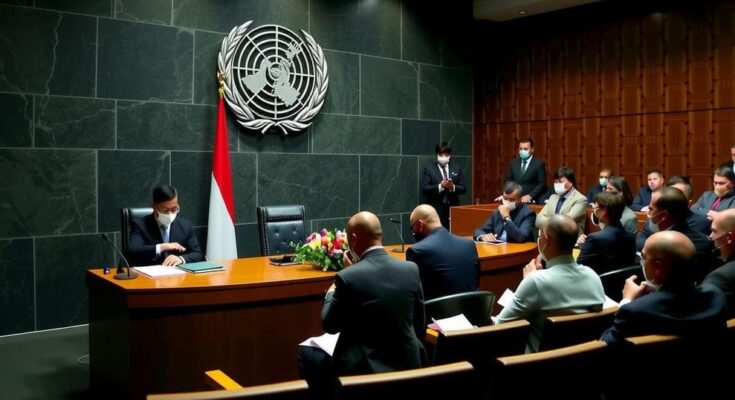On February 19, Indonesia will support South Africa’s case against Israel at the ICJ over alleged genocide in Gaza, despite not being a party to the 1948 Genocide Convention. Indonesian Foreign Minister Retno Marsudi will seek an advisory opinion from the ICJ, while international support for the case grows amid the ongoing humanitarian crisis in Gaza, which has resulted in significant casualties and destruction since October 7.
On Wednesday, Indonesia announced its support for South Africa in a legal case against Israel at the International Court of Justice (ICJ), scheduled to commence hearings on Thursday concerning alleged war crimes. Indonesia’s Foreign Minister, Retno Marsudi, is set to present an oral statement at the ICJ on February 19, in the context of South Africa’s allegations of genocide purportedly committed by Israel in Gaza. Lalu Muhammad Iqbal, spokesman for the Indonesian Foreign Ministry, emphasized that Indonesia firmly backs South Africa’s efforts in urging the ICJ to address the situation in Gaza, asserting, “Morally and politically, Indonesia fully supports South Africa’s initiative to push the ICJ to react to the alleged genocide in Gaza.” However, Iqbal noted that Indonesia is unable to participate in the lawsuit due to not being a signatory to the 1948 Genocide Convention. Marsudi’s forthcoming statement will seek an advisory opinion from the ICJ following a request by the UN General Assembly regarding the legal ramifications of Israel’s occupation of Palestinian territories. The lawsuit was filed by South Africa on December 29, asserting that Israel’s actions since October 7 contravene the 1948 UN Convention on the Prevention and Punishment of the Crime of Genocide. The case hearings are to be held in The Hague, with backing from countries such as Türkiye, Bolivia, and Malaysia. Furthermore, the Organization of Islamic Cooperation has expressed support for South Africa’s lawsuit, urging the ICJ to take swift action against what they label as genocide occurring in the Occupied Palestinian Territories. Since the outbreak of hostilities following a Hamas incursion on October 7, Israeli military actions have resulted in significant civilian casualties in Gaza, including over 23,210 Palestinian fatalities and severe infrastructure damage, while nearly two million residents are currently displaced and suffering from acute shortages of essential resources.
The issue at hand revolves around the ongoing conflict between Israel and Palestinian groups, particularly regarding Israel’s military operations in Gaza. The lawsuit filed by South Africa at the ICJ is premised on accusations of genocide against Israel, highlighting the significant loss of life and destruction attributed to its military actions following the escalation of violence that began in October 2023. The International Court of Justice serves as a principal judicial organ of the United Nations, which adjudicates disputes between states and gives advisory opinions on international legal issues. The support provided by Indonesia, alongside other countries and organizations, indicates a growing international concern regarding the humanitarian crisis in Gaza and the legal implications of Israel’s actions under international law.
Indonesia’s endorsement of South Africa’s legal action against Israel at the ICJ underscores its commitment to addressing alleged human rights violations in Gaza. Although Indonesia cannot legally join the proceedings due to its non-participation in the 1948 Genocide Convention, its moral and political support reflects a broader international call for accountability regarding the conflict. The hearings at the ICJ will serve as a critical platform for evaluating the legal ramifications of the situation, while the humanitarian crisis in Gaza continues to escalate.
Original Source: www.aa.com.tr




